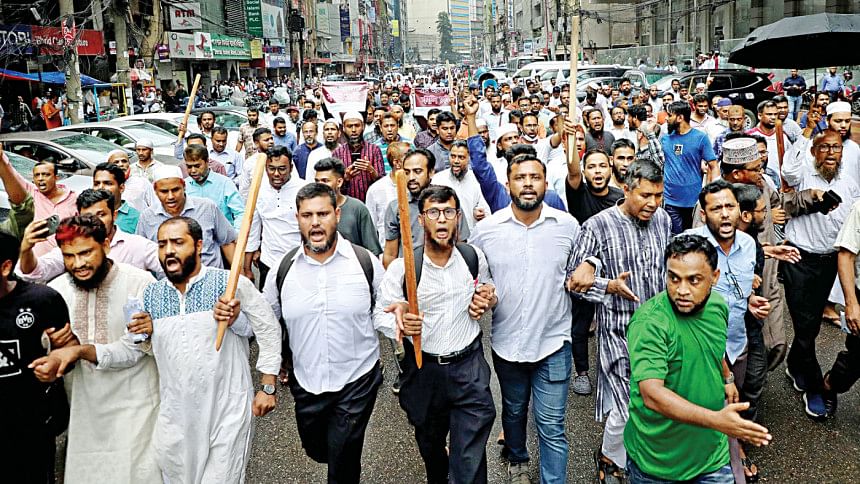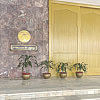Unrest in banking sector raises concerns

Unrest has gripped the banking sector at a time when several banks are burdened with huge default loans and are suffering from low asset quality.
Protests erupted at Bangladesh Bank the day after Sheikh Hasina's government was ousted on August 5 in the face of a mass uprising. The deputy governors who were appointed contractually during the former prime minister's tenure were similarly forced to resign from their positions.
But the unrest is not limited to the central bank as demonstrations are ongoing at Sonali Bank, the biggest bank in terms of branch network, and Islami Bank, the biggest bank in terms of deposits.
Three private banks -- United Commercial Bank, Social Islami Bank and IFIC Bank -- have also seen protests following Hasina's escape from the country.
Industry insiders said the situation is also heating up at other banks whose directors were connected to the Awami League government, creating more concerns for a sector that is already suffering due to rocketing default loans.
Bad loans in the banking sector hit an all-time high of Tk 182,295 crore as of March this year, accounting for 11.10 percent of the total outstanding loans.
Bankers said one of the main reasons for the rise in loan defaults is interference in board activities by politically influential people.
"The protests are not a solution for the problems of the banking sector. Rather, this might deepen the problem," said Toufic Ahmad Choudhury, director general of the Bangladesh Academy for Securities Markets.
"The problem varies from bank to bank. So, the same medicine and equal dose should not be applied to all," he added.
Citing that the central bank has already identified several weak banks, he said a commission should now be formed to analyse their problems and suggest remedies.
Choudhury, also a former director general of the Bangladesh Institute of Bank Management, said common problems in the banking sector include a lack of good governance. "But this can be improved by ensuring strict monitoring by the central bank," he added.
A top official of a bank said a major target of the demonstrators is to create a situation that compels the bank authorities to dissolve their boards so that other major shareholders, who were deprived of directorship during the previous government's tenure, can replace them.
He suggested that the Bangladesh Bank dissolve the boards or remove directors and appoint independent directors at ailing banks for the benefit of banks and the sector as a whole.
"This will get lenders out of the grip of politically influential people," the official added.
"The central bank's monitoring and oversight becomes weak whenever politically influential people or public figures enter a bank's board," said Mamun Rashid, an economic analyst and veteran banker.
"If the board members are politically influential, the bank's management cannot work independently," he added.
"So, banks should be run by real sponsors, promoters and those who have expertise," he said, adding that there is a process to follow when changing bank ownership.
Bangladesh Bank could also form a committee with members of the Bangladesh Securities and Exchange Commission. The committee could then analyse who are the best fit among the sponsors of the banks, added Rashid, also a former managing partner of PwC Bangladesh.
Rashid said banks should not be controlled by politically powerful people. Instead, people with proper knowledge on the financial sector, and adequate expertise and integrity should be hired as directors.
Furthermore, the commission could set criteria that keep banks away from political influence. Also, it could suggest how long members of a single family will be allowed to work as directors.
Additionally, the commission could outline how many members of a single family can be allowed to join as directors of a bank, he added.
Asif Khan, president of the CFA Society, said Bangladesh Bank needs to take swift action to ensure that no official can run away with funds at the last moment.
So, it can appoint an administrator for the banks that are facing such threats. Otherwise, this type of chaos will erode people's confidence in the banking sector, added Khan, also chairman of Edge Asset Management.
Anis A Khan, a former chairman of the Association of Bankers, Bangladesh, said demonstrations are being held as several banks were taken over by force in the past.
"Now, the original owners are asserting their authority," he added.
Khan also said the issue is mainly between bank owners and management officials who were deprived of directorship positions in the past.
"So, this should not concern depositors and investors," he added.

 For all latest news, follow The Daily Star's Google News channel.
For all latest news, follow The Daily Star's Google News channel. 





Comments